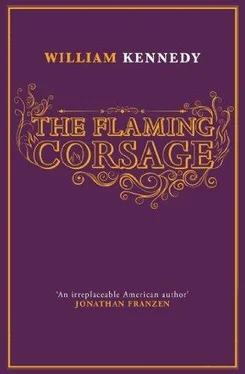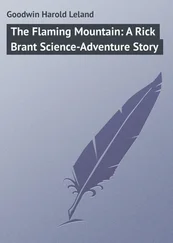GILES: The condemned heart still beats. Temperature at contact points now two hundred fourteen degrees, nicely above boiling point. Crepitation noted throughout. Anterior epithelial cells of the cornea have desquamated from the action of heat. Sclera of left eye bulges at its left corneal junction. Scalp and skin of neck have a dull, purplish hue, with blisters on temples, cheeks, and eyelids. Epidermis at flexure of knee joint has been torn away. How are you feeling, Mr. Maginn?
MAGINN ( Weakly ): Violet piss, golden pigs.
GILES: Then let us continue.
(He waves hand again to EXECUTIONER, etc.)
Edward stopped reading. He ordered the pages of the play and walked downstairs to the kitchen, the heat no longer tolerable. He pumped water, wet his face, hair, arms. He walked, dripping, to the front porch, sat in his father’s rocking chair, and stared at the corner of the porch. The flood this spring had tilted it another fraction of an inch eastward: fittingly askew.
He stared up the empty street and saw his young self walking off it forever (oh yes) and out of this city into worlds no boy, no man on this block, except his father, could even have imagined. Now he was back, solitary Main Streeter: no visitors, curtains drawn, answering no rings of the bell, no knocks, reading no mail, food delivered by Drislane’s.
The oaks and the elms are in full leaf, the honeysuckle bush his mother planted in 1859, when the house was new, when Main Street and Edward were new, is a tree now, yielding berries, and the robins are eating them. Nobody hates these leaves, these berries, these robins, the way people hate Edward. Neither will Edward love any of them for their overrated glory, their vaunted beatitude. You think such mindless things deserve love? Love is what you feel during yesterday’s lightning storms. And then here come the dogs.
He saw two boys with sticks running down from Broadway, chasing a dog that was leaving them behind, that ran into the horse-shoe court between Joe Farrell’s and Edward’s houses, across Francis Phelan’s backyard, and was gone.
“You won’t catch him now, boys,” Edward said, and the boys stopped and looked at him. “And there’s gardens back there. You wouldn’t want to run through them.”
“He bit me,” one boy said.
“Did he draw blood?”
The boy, in short pants, looked at his bare leg. Edward could see a line of blood from calf to ankle.
“Yeah, he got me,” the boy said.
“You should go see Doc McArdle,” Edward said. “You know where he lives?”
“Doc McArdle is dead,” the boy said.
“Is he?”
“His horse kicked him in the head.”
The boy bent his leg to look at the wound, spat on it, and rubbed up the trickle of blood with two fingers. He snapped the spit and blood off the fingers, pulled a leaf off an oak tree and wiped the wound.
“I’ll put a bandage on it,” the second boy said, and he took off the red bandanna he was wearing on his neck and tied it around his friend’s wound. The boy who’d been bitten took a few steps, limping.
“It hurts,” he said.
He picked up a stone and hurled it at the garden where the dog had fled. The second boy picked up two stones and threw them at the eastern sky that arced toward the bed of the Erie Canal that was: whelps all: the dog, the boys, Edward.
The moon sent down its light to weave an image in the branches of an oak tree, and Edward saw in it Emmett’s face: a grid of sinew and wisdom that would not stay in the grave. There, perfectly etched by leaf and moonlight, were the lines of the Emmett nose and jaw, the wry slash of smile, vanishing, then reappearing in the flickering light’s gestalt. Keeper of the flame. But there is no longer a flame. Your father is preparing for your departure, Edward.
Under this July moon, now shaped like a battered face, Edward left the porch, walked past the lot where the cattle pens used to be on Champlain Street, parallel to the tracks and the all-but-dead canal. Beyond the canal half a dozen of forty-two sawmills were still active in the Lumber District, which was dying from want of softwood: so many Adirondack pine forests denuded, so few people working in the District that for sixty years gave jobs to men by the swarm: now a zone of quiet. No more overflowing lunch crowds in Black Jack’s, no more cardsharps at the tables, no more brawls, no more dead horses in the canal, all work in the foundries now, or over the hill in the West End, at the Central’s railroad shops. Purpose vanishing from North Albany, eclipsed like the dead Irish of Connacht. Potential actualized into a living neighborhood. And then? Yes. What, then, is the potential of the new actuality?
He walked up Erie Street past the icehouse, and the site of the old wooden Sacred Heart church, where pigs and chickens came to mass, now a vacant lot. He passed the car barns. When he read the Car Barns play to his father in his sickbed (for he would not live to see it performed) Emmett had asked:
“Is that fella in the play supposed to be me?”
“Does he sound like you?”
“He does.”
“Did you say those things he says?”
“Never.”
“So there you are. You and not you, reality and fantasy in one package.”
“You’re a glib man. If you don’t change your ways you’ll come to a bad end.”
Prophetic.
He turned onto Broadway, bats swooping through the glow of streetlamps, and saw Cappy White with a growler under his arm. Edward hadn’t seen Cappy since his son, Bitsy, a softspun boy born without ears, who’d earned candy money eating live frogs for a nickel, went up in flames in church while lighting a candle for his mother, Mamie. Mamie weighed maybe five hundred pounds — nobody ever found a way to weigh her — and grew wider with the years. When Doc McArdle came to examine her dropped stomach she refused him access: “I never showed my front end to anybody but Cappy White. He was the first one, he’ll be the last one.”
Mamie stayed in the house, could not leave it even for Bitsy’s funeral, did not fit into the stairwell. When she died Cappy knocked out siding and two windows, then backed up a derrick to lift her out of bed and carry her to her own funeral. After that he took himself to bed and stayed there, leaving it only to buy food and beer. Hermit of Main Street, punished by the gods for marrying fat and cherishing a freakish child. What peculiar shapes love takes.
“Hi ya, Cappy,” Edward said.
“Who’s that?”
“Eddie Daugherty.”
“Eddie, yeah, you’re back. I heard you lost everything.”
“That’s right, Cappy.”
“So did I.”
“I know.”
“How you livin’?”
“Best way I can.”
“You still got your son,” Cappy said.
“I guess you could say that.”
“I lost my son.”
“I know you did. I hate that, Cappy.”
“So do I.”
“You get out much, Cap?”
“Nope. No reason to.”
“Maybe it’ll get better.”
“No, it won’t get no better. You oughta know that.”
“I keep wondering whether it’s finished.”
“It’s finished.”
“How do you know?”
“They ain’t nothin’ worth doin’.”
“It seems like that, all right.”
“You came back to North Albany.”
“I did,” said Edward.
“What for?”
“No place else to go.”
“That’s a good reason. So long, Eddie.”
Cappy turned toward his house and Edward thought: Now Main Street has two hermits. He walked to Jack McCall’s saloon for an ale. Respite. But maybe not. The night he moved back to Main Street he stopped at Jack’s for an ale. Smiler McMahon and Petey Parker were at the bar when he came up beside them.
Читать дальше












